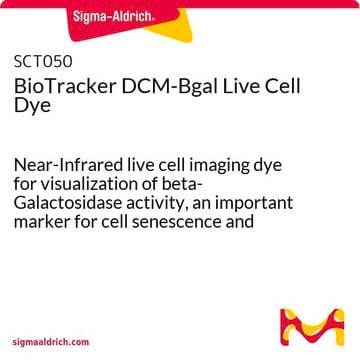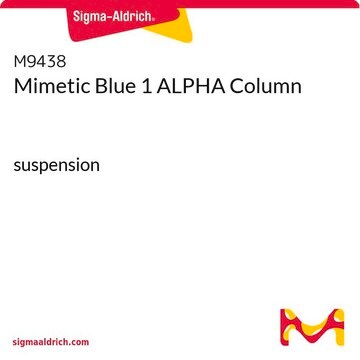Recommended Products
species reactivity
human
Quality Level
manufacturer/tradename
Chemicon®
technique(s)
ELISA: suitable
flow cytometry: suitable
immunocytochemistry: suitable
immunohistochemistry: suitable
immunoprecipitation (IP): suitable
western blot: suitable
shipped in
dry ice
General description
Chemicon Investigator Kits for Integrin Research are a cost-effective source of reagents for all investigators involved with this expanding field of study. The Chemicon Alpha Integrin Blocking and Immunohistochemistry Investigator Kit is designed for research on the functional activity and cellular localization of human integrin alpha subunits.
Integrins belong to a large family of cell surface proteins commonly referred to as glycoproteins. Integrins are composed of noncovalently associated alpha and beta subunits which make up heterodimers: the larger termed alpha chain and the smaller beta chain. At least 16 alpha subunits and 8 beta subunits are expressed, which can give rise to 22 different integrins. Integrins are thought to play critical roles in cell migration, differentiation, and survival. There is now considerable evidence that these transmembrane receptors play an important role in the regulation of gene expression and signal transduction. Excellent reviews of integrin structure, function, and ligand specificity may be found in: Hynes, R. 1992. Cell 69:11-25; Kramer, R. 1993. "Integrin Structure and Ligand Specificity in Cell-Matrix Interactions" in Molecular and Cellular Aspects of Basement Membranes. Academic Press.
Chemicon offers the Alpha Integrin Blocking and Immunohistochemistry Investigator Kit for studies of integrin alpha subunits. All kit reagents are also available in larger sizes. The reagents in this kit are not application specific but rather may be used in a variety of procedures, depending upon the needs of the individual investigator.
Integrins belong to a large family of cell surface proteins commonly referred to as glycoproteins. Integrins are composed of noncovalently associated alpha and beta subunits which make up heterodimers: the larger termed alpha chain and the smaller beta chain. At least 16 alpha subunits and 8 beta subunits are expressed, which can give rise to 22 different integrins. Integrins are thought to play critical roles in cell migration, differentiation, and survival. There is now considerable evidence that these transmembrane receptors play an important role in the regulation of gene expression and signal transduction. Excellent reviews of integrin structure, function, and ligand specificity may be found in: Hynes, R. 1992. Cell 69:11-25; Kramer, R. 1993. "Integrin Structure and Ligand Specificity in Cell-Matrix Interactions" in Molecular and Cellular Aspects of Basement Membranes. Academic Press.
Chemicon offers the Alpha Integrin Blocking and Immunohistochemistry Investigator Kit for studies of integrin alpha subunits. All kit reagents are also available in larger sizes. The reagents in this kit are not application specific but rather may be used in a variety of procedures, depending upon the needs of the individual investigator.
Application
Research Category
Cell Structure
Cell Structure
Research Sub Category
Integrins
Integrins
Components
alpha1 Mouse Monoclonal Antibody (Part No. MAB1973Z-20) - 1 tube, 20 μg.
alpha2 Mouse Monoclonal Antibody (Part No. MAB1950Z-20) - 1 tube, 20 μg.
alpha3 Mouse Monoclonal Antibody (Part No. MAB1952Z-20) - 1 tube, 20 μg.
alpha4 Mouse Monoclonal Antibody (Part No. MAB16983Z-20) - 1 tube, 20 μg.
alpha5 Mouse Monoclonal Antibody (Part No. MAB 1956Z-20) - 1 tube, 20 μg.
alpha6 Rat Monoclonal Antibody (Part No. MAB1378-20) - 1 tube, 20 μg.
alphaV Mouse Monoclonal Antibody (Part No. MAB1953Z-20) - 1 tube, 20 μg.
alpha2 Mouse Monoclonal Antibody (Part No. MAB1950Z-20) - 1 tube, 20 μg.
alpha3 Mouse Monoclonal Antibody (Part No. MAB1952Z-20) - 1 tube, 20 μg.
alpha4 Mouse Monoclonal Antibody (Part No. MAB16983Z-20) - 1 tube, 20 μg.
alpha5 Mouse Monoclonal Antibody (Part No. MAB 1956Z-20) - 1 tube, 20 μg.
alpha6 Rat Monoclonal Antibody (Part No. MAB1378-20) - 1 tube, 20 μg.
alphaV Mouse Monoclonal Antibody (Part No. MAB1953Z-20) - 1 tube, 20 μg.
Physical form
Chemicon′s Alpha Integrin Blocking and Immunohistochemistry Kit is perfect for the functional blocking and immunohistochemical detection of alpha integrin subunits. The kit contains 20 μg each of monoclonals to alpha1, alpha2, alpha3, alpha4, alpha5, alpha6, and alphaV.
Storage and Stability
Store antibodies at -20°C.
Important Note: Due to the small volumes contained within the kit, we recommend gently tapping the vial on a hard surface or briefly centrifuging the vial in a tabletop centrifuge before opening to dislodge any liquid entrapped in the container′s cap during shipment.
Important Note: Due to the small volumes contained within the kit, we recommend gently tapping the vial on a hard surface or briefly centrifuging the vial in a tabletop centrifuge before opening to dislodge any liquid entrapped in the container′s cap during shipment.
Legal Information
CHEMICON is a registered trademark of Merck KGaA, Darmstadt, Germany
Disclaimer
Unless otherwise stated in our catalog or other company documentation accompanying the product(s), our products are intended for research use only and are not to be used for any other purpose, which includes but is not limited to, unauthorized commercial uses, in vitro diagnostic uses, ex vivo or in vivo therapeutic uses or any type of consumption or application to humans or animals.
Storage Class Code
10 - Combustible liquids
Certificates of Analysis (COA)
Search for Certificates of Analysis (COA) by entering the products Lot/Batch Number. Lot and Batch Numbers can be found on a product’s label following the words ‘Lot’ or ‘Batch’.
Already Own This Product?
Find documentation for the products that you have recently purchased in the Document Library.
Rong Zhang et al.
Nature communications, 4, 1335-1335 (2013-01-10)
Cultures of human embryonic stem cell typically rely on protein matrices or feeder cells to support attachment and growth, while mechanical, enzymatic or chemical cell dissociation methods are used for cellular passaging. However, these methods are ill defined, thus introducing
Minhong Shen et al.
Cancer cell, 35(1), 64-80 (2019-01-08)
Triple-negative breast cancer (TNBC) patients have the worst prognosis and distant metastasis-free survival among all major subtypes of breast cancer. The poor clinical outlook is further exacerbated by a lack of effective targeted therapies for TNBC. Here we show that
Jessica E Frith et al.
Journal of cell science, 125(Pt 2), 317-327 (2012-01-18)
Mesenchymal stem cells (MSCs) have attracted great interest in recent years for tissue engineering and regenerative medicine applications due to their ease of isolation and multipotent differentiation capacity. In the past, MSC research has focussed on the effects of soluble
Identification of extracellular matrix components and their integrin receptors in the human fetal adrenal gland.
E Chamoux, L Bolduc, J G Lehoux, N Gallo-Payet
The Journal of clinical endocrinology and metabolism null
Harry Ma et al.
Circulation research, 93(11), 1066-1073 (2003-10-25)
The migration of vascular smooth muscle cells (SMCs) from the media into the neointima and their subsequent proliferation is important in the pathogenesis of atherosclerosis. This process is regulated by multiple factors, including growth factors, and involves changes in the
Our team of scientists has experience in all areas of research including Life Science, Material Science, Chemical Synthesis, Chromatography, Analytical and many others.
Contact Technical Service








